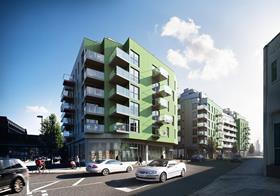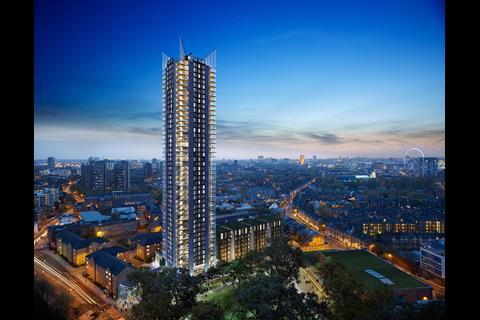Could fundamental changes to the cladding industry be the key to providing cost-effective, high-quality private rental accommodation?
Everybody agrees that the private rental sector needs to change. It is dominated by an army of unregulated buy-to-let investors, which means many renters risk ending up in badly maintained, draughty old houses without any security of tenure. There has been plenty of talk about large-scale, purpose-built private rental development but very little action, largely because it hasn’t been economically worthwhile for institutional investors. To make the business model stack up, developers need to deliver apartments as cost-effectively as possible, which includes ensuring that schemes are as durable as possible, easy to maintain, and delivered on time and to budget.
This is the challenge facing Essential Living, a developer and private landlord that plans to build 5,000 apartments to rent in London and the South-east over the next 10 years. It is construction director Ray Theakston’s job to squeeze every last drop of value out of the industry. He spends a lot of time scrutinising products to get the best balance of performance, cost, style and durability, and standardising elements as much as practically possible to keep costs down. Theakston has identified cladding as one of the biggest risks to this business model.
“Every single one of our consultants and contractors has concerns over cladding, either from the technical point of view, such as the potential for leaks or panels falling off buildings, or in terms of delays to projects,” he says. “We have a £1bn pipeline of work over the next 10 years with cladding forming 15-20% of that. If you put that in the context of the problems the industry is suffering, that is a major risk for us.”
The problems within the UK cladding sector stem from specialists trying to make themselves attractive to contractors by offering low prices - often with predictable consequences. “The average life expectancy of a [UK] cladding supplier is only seven years,” explains Chris Macey, group managing director of facade engineering consultant Wintech. “This makes it very difficult to build up the expertise to serve the market. As a result, there is a shortage of good UK companies.”

These problems are felt particularly acutely on high-rise projects, which is an issue for Essential Living as most of its upcoming projects are tall apartment blocks. Theakston is so concerned that he commissioned Wintech to help him to identify ways of minimising the risks.
One option that many developers choose, according to Macey, is to look overseas for cladding specialists. But Theakston doesn’t see this as a solution. “We need attractive solutions that are acceptable to the planners, comply with level 4 of the Code for Sustainable Homes and are at a price we can afford,” he says.
Cladding suppliers from Germany and Austria offer a quality product but, as with German cars, this comes at a price premium. There are cheaper European countries, such as Portugal, but Macey says they don’t tend to understand UK Building Regulations, particularly regarding thermal bridging, which makes compliance difficult. Far Eastern suppliers also have to contend with UK regulations, and the physical distance makes Theakstonwary. “There is a bigger risk with deliveries that is beyond our control,” he says.
There is another threat to Essential Living’s business model. Both Macey and Theakston are worried that a resurgent residential and commercial market will result in price inflation. “There’s going to be huge inflation in cladding, as the UK market was destroyed during the recession,” warns Macey.
What is the answer to this conundrum? Macey is convinced these problems will lead to a fundamental shake-up within the industry. “I think future changes to regulations will completely change the way we procure cladding,” he says. The industry will return to a more traditional form of procurement where a detailed design is worked up by a consultant team and put out to tender rather than relying on the skills of the cladding contractor to develop the solution.
“The services and cladding engineers need to be involved at a much earlier point to discuss facade strategies before the project goes in for planning,” he says.
This approach has the advantage of using UK expertise to ensure the design complies with regulations. It also means that several suppliers can work on a facade solution with less risk of interface problems - if a supplier goes bust, the design is owned by the client rather than the supplier, which makes putting in a replacement much easier.
Theakston agrees with Macey and has taken the unusual step of engaging Wintech as cladding consultant on all of Essential Living’s projects. “Facade consultants are usually brought in too late to troubleshoot rather than

preventing problems in the first place,” says Theakston.
Wintech will have considerable influence over facade solutions. “As soon as an architect comes up with a concept it has to go through Wintech to ensure it works from the engineering point of view,” says Theakston. “If the architect can’t get it past Wintech, they can’t do it.”
Essential Living is ready to start on site with two projects in the first quarter of this year - one in Bethnal Green, east London, the other in Maidenhead, Berkshire. For the sake of all those people looking for a decent place to rent, let’s hope this approach works.





























1 Readers' comment